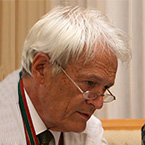
One of the world’s most influential epidemiologists and health statisticians, Sir Richard Peto has helped transform public policy and popular attitudes in many countries towards the full eventual hazards of smoking and the correspondingly large benefits of stopping. Professor Peto was co-author with Sir Richard Doll of a series of reports from the 1970s to the present, of a 50-year prospective study of mortality in relation to smoking among British doctors, and of an influential 1981 report quantifying the avoidable causes of cancer in the United States. This U.S. report firmly established that smoking caused far more cancer deaths than all other reliably known causes combined.
His studies also demonstrated that the long-term benefits of smoking cessation are greater than previously thought, thus encouraging smokers to quit. For these efforts and his overall contributions to cancer epidemiology and prevention, he was knighted by Queen Elizabeth in 1999. Sir Richard has also helped lead very large studies of the current and future hazards of smoking in both China and India. Worldwide, he has shown that there were approximately 100 million deaths attributed to smoking in the last century and that if current smoking patterns persist, there will be nearly 1000 million this century. To date, he continues to publish studies from many countries monitoring the evolution of this epidemic.
Forty years ago, Sir Richard introduced the logrank test, and 30 years ago he established the Early Breast Cancer Trialists’ Collaborative Group (EBCTCG), which regularly brings together detailed data from each of some hundreds of thousands of individual women enrolled in hundreds of trials, to define the effects of widely practicable clinical treatments on long-term survival. For such meta-analyses, he was made a Fellow of the Royal Society of London in 1989.
Career Highlights
2017 William L. McGuire Memorial Lecture Award
2011 Lifetime Achievement Award, British Medical Journal Group
2010 Lifetime Achievement Prize, Cancer Research UK
2006 Luther L. Terry Award, American Cancer Society
2004 Elected Foreign Associate, Institute of Medicine
2003 Distinguished Service Award, ASCO
2002 Charles S. Mott Prize, General Motors Cancer Research Foundation
2001 Lynn Sage Distinguished Award in Breast Cancer Research
2000 Polish Presidential Public Health Award
1999 Knight Bachelor of the British Empire, Queen’s Birthday Honours
1997 Gold Award, Polish Health Promotion Foundation
1997 Prix Louis-Jeantet de médicine, Fontation Louis-Jeantet
1992 Canada Gairdner International Award
1989 Honorary Professor, Chinese Academy of Preventive Medicine
1989 Elected Fellow, The Royal Society, London
1986 Guy Silver Medal, Royal Statistical Society